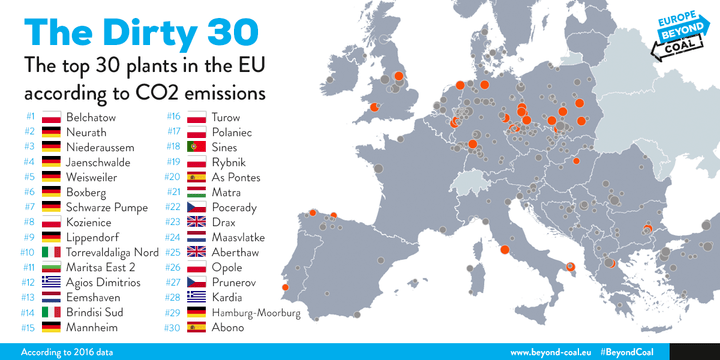Anders Bjartnes, Chief Editor Energi og Klima
BEYOND COAL
The next couple of weeks is the old West German capital Bonn arena for the UN’s annual climate meeting, COP 23. Before the meeting, pressure on Germany increases despite strong growth and progress in renewable energy still has one of the dirtiest power systems in Europe. «Europe Beyond Coal» is a new campaign that is now being launched – the goal is a Europe-free Europe by 2030. Germany has seven of the ten most polluting coal power plants. A similar campaign has achieved a lot in the United States.
Our guests will be surprised at how dependent we are,”
says Annalena Baerbock, who is the climate spokesman for Die Grünen.
Germany’s two faces in climate policy are described by Politico. Just outside Bonn lies one of the lignite-fired power stations that are among the most polluting in Europe. Here is an analysis of the future of coal from Thomson Reuters. The close connection between coal power and the rest of the energy system and the effects of the CO2 price means that all climate and energy policies are strongly influenced by what happens to the coal.
According to Thomson-Reuters, almost 40 percent of emissions within the quota system are coal-fired. Phasing out the coal will, therefore, lead to lower CO2 prices, which means lower emission costs for the industry – but no incentive to cut emissions. Many preliminary issues are published before COP23, and we bring this from Deutsche Welle, which tells about a lot of activity and initiative from global business – and is angry that Donald Trump failed to kill the climate agreement.
TO LATE, TO LITLE: UN’s Environment Program UNEP, led by Erik Solheim, delivers every year it’s “Emission Gap Report” which reviews how the world is in the process of reaching climate goals. Not surprisingly, the report shows that there is a great need to accelerate the decarbonization of the economy if the world is to go against the goals set in Paris. The report says that more active efforts are needed in the short and long term. Phasing out coal and accelerating the development of renewable energy is what is needed.
But there are opportunities for faster conversion – one of the issues of the week’s report is that growth in private sector investment can bring the world on a course that matches the climate goals.





11 Comments
Pingback: find more info
Pingback: สล็อต
Pingback: Where can i buy albino a+ mushrooms in france free
Pingback: buy magic mushrooms online australia
Pingback: 웹툰 미리보기
Pingback: ดูหนังออนไลน์ใหม่
Pingback: buy LSD online
Pingback: Hot dogs at Costco,Why Are Cotsco Hot dogs so inexpensive?,$1.50 Hot dog deal at costco,Are Costco Hot dogs any good?,Cheap hot dog at Costco food court,Weird History Food,Weird History Food Costco,Buying Food at Costco,Food inflation Costco Hot dogs,Cost
Pingback: แจกวาร์ป
Pingback: Dryer Vent Installation Wesley Chapel
Pingback: Bilad Alrafidain University College